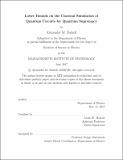Lower bounds on the classical simulation of quantum circuits for quantum supremacy
Author(s)
Dalzell, Alexander M
DownloadFull printable version (722.3Kb)
Other Contributors
Massachusetts Institute of Technology. Department of Physics.
Advisor
Aram W. Harrow.
Terms of use
Metadata
Show full item recordAbstract
Despite continued experimental progress, no task has yet been performed on quantum technology that could not also have been performed quickly on today's classical computers. One proposed path toward achieving this milestone, which is often referred to as quantum supremacy, is to perform specific types of quantum circuits for which it is guaranteed, under plausible complexity theoretic conjectures, that any classical approximate weak simulation algorithm for these circuits must take more than polynomial time. Instantaneous quantum (IQP) circuits and Quantum Approximate Optimization Algorithm (QAOA) circuits are examples of circuits with this guarantee under the assumption that the polynomial hierarchy (PH) does not collapse. However, these arguments do not communicate how large these quantum circuits must be built before simulating them is hard in practice. We show how a fine-grained version of this assumption involving the PH leads to a fine-grained lower bound on the simulation time for IQP and QAOA circuits. Using the lower bound, we conclude that IQP circuits must contain roughly 1700 qubits, and QAOA circuits must contain roughly 7100 qubits before their simulation would be guaranteed to be intractable on today's fastest supercomputers. Additionally, we apply the same logic to find an asymptotic lower bound on the classical weak simulation of Clifford + T circuits with n qubits, m Clifford gates, and t T gates, concluding that any simulation with runtime of the form poly(n;m)2[gamma]t must have [gamma] > 1/135 [approximately equal] 0:0074. The best existing algorithm of this form [gamma] [approximately equal] 0:228.
Description
Thesis: S.B., Massachusetts Institute of Technology, Department of Physics, 2017. This electronic version was submitted by the student author. The certified thesis is available in the Institute Archives and Special Collections. Cataloged from student-submitted PDF version of thesis. Includes bibliographical references (pages 91-93).
Date issued
2017Department
Massachusetts Institute of Technology. Department of PhysicsPublisher
Massachusetts Institute of Technology
Keywords
Physics.